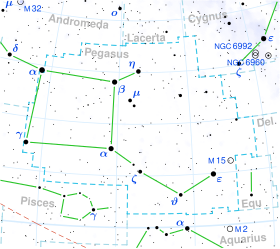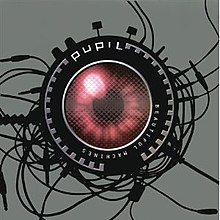피1 페가수스
Pi1 Pegasi| 관측 데이터 신기루 J2000.0 이쿼녹스 J2000.0 | |
|---|---|
| 별자리 | 페가수스 |
| 우측 상승 | 22h 09m 13.61893s[1] |
| 탈위임 | +33° 10′ 20.4778″[1] |
| 겉보기 크기 (V) | +5.58[2] |
| 특성. | |
| 스펙트럼형 | G8IIB |
| B-V색지수 | +0.985±0.003[2] |
| 아스트로메트리 | |
| 방사 속도 (Rv) | +5.1±0.9km[4]/s |
| 고유 운동 (μ) | RA: -48.168mas[1]/yr Dec.: −73.408[1]mas/yr |
| 시차 (π) | 10.211 ± 0.1137[1] 마스 |
| 거리 | 319 ± 4 리 (98 ± 1 pc) |
| 절대치수 (MV) | 0.84[5] |
| 세부 사항 | |
| 미사 | 2.48[6] M☉ |
| 반지름 | 11.00+0.51 −0.83[1] R☉ |
| 루미도 | 62.8±0.8[1] L☉ |
| 표면 중력 (log g) | 2.7[7] cgs |
| 온도 | 4,898+196 −110[1] K |
| 금속성 [Fe/H] | -0.22[5] 덱스 |
| 회전 속도 (v sin i) | 시속 135km[7] |
| 나이 | 530Myr[6] |
| 기타 지정 | |
| 데이터베이스 참조 | |
| 심바드 | 자료 |
피11 페가수스자리(Pi Pegasi)는 gas 페가수스자리로부터 라틴어로 표기된 별이다.가시성 성분의 적절한 움직임에 대한 변화에 기초하여, 이것은 개연성 있는 천체 이항이다.[9]노란색 빛깔을 가지고 있으며, 육안으로 볼 때 희미하게 보이며, 겉보기 등급이 +5.58이다.[2]이 시스템은 시차(parallax)를 기준으로 태양으로부터 약 319광년 떨어진 곳에 위치하며,[1] 방사상 속도 +5 km/s로 더 멀리 떠내려가고 있다.[4]함께 움직이는 스타들의 우르사 메이저 무빙 그룹의 멤버다.[10]
눈에 보이는 성분은 G8IIb의 별 분류를 가진 노화된 거대 별이다.[3]회전 속도가 135km/s로 예측되는 높은 회전 속도를 가지고 있다.[7]이것은 극 반지름보다 17% 더 큰 적도 불량을 주고 있다.[11]그것은 더 차가운 가스로 이루어진 별 모양의 별에 의해 궤도를 선회하고 있는 껍데기 별이다.[12][13]이 별은 태양 질량의 2.5배에[6] 달하는 5억[6] 3천만년 된 것이다.중심부에서 수소의 공급이 소진되면서 이 별은 냉각되어 태양 반지름의 11배까지[1] 팽창했다.그것은 4,898K의 유효 온도에서 확대된 광권으로부터 태양의 63배의[1] 광도를 방출하고 있다.[1]
참조
- ^ a b c d e f g h i j k l Brown, A. G. A.; et al. (Gaia collaboration) (August 2018). "Gaia Data Release 2: Summary of the contents and survey properties". Astronomy & Astrophysics. 616. A1. arXiv:1804.09365. Bibcode:2018A&A...616A...1G. doi:10.1051/0004-6361/201833051.이 소스에 대한 가이아 DR2 기록 VizieR.
- ^ a b c Anderson, E.; Francis, Ch. (2012), "XHIP: An extended hipparcos compilation", Astronomy Letters, 38 (5): 331, arXiv:1108.4971, Bibcode:2012AstL...38..331A, doi:10.1134/S1063773712050015, S2CID 119257644.
- ^ a b Abt, H. A. (September 1985), "Visual multiples. VIII. 1000 MK types", Astrophysical Journal Supplement Series, 59: 95–112, Bibcode:1985ApJS...59...95A, doi:10.1086/191064
- ^ a b Gontcharov, G. A. (November 2006), "Pulkovo Compilation of Radial Velocities for 35495 Hipparcos stars in a common system", Astronomy Letters, 32 (11): 759–771, arXiv:1606.08053, Bibcode:2006AstL...32..759G, doi:10.1134/S1063773706110065, S2CID 119231169.
- ^ a b Takeda, Yoichi; et al. (August 2008), "Stellar Parameters and Elemental Abundances of Late-G Giants", Publications of the Astronomical Society of Japan, 60 (4): 781–802, arXiv:0805.2434, Bibcode:2008PASJ...60..781T, doi:10.1093/pasj/60.4.781.
- ^ a b c d Luck, R. Earle (2015), "Abundances in the Local Region. I. G and K Giants", The Astronomical Journal, 150 (3): 88, arXiv:1507.01466, Bibcode:2015AJ....150...88L, doi:10.1088/0004-6256/150/3/88, S2CID 118505114.
- ^ a b c Massarotti, Alessandro; et al. (January 2008), "Rotational and Radial Velocities for a Sample of 761 HIPPARCOS Giants and the Role of Binarity", The Astronomical Journal, 135 (1): 209–231, Bibcode:2008AJ....135..209M, doi:10.1088/0004-6256/135/1/209
- ^ "pi Peg". SIMBAD. Centre de données astronomiques de Strasbourg. Retrieved 2019-10-13.
- ^ Eggleton, P. P.; Tokovinin, A. A. (September 2008), "A catalogue of multiplicity among bright stellar systems", Monthly Notices of the Royal Astronomical Society, 389 (2): 869–879, arXiv:0806.2878, Bibcode:2008MNRAS.389..869E, doi:10.1111/j.1365-2966.2008.13596.x, S2CID 14878976.
- ^ Schmitt, J. H. M. M.; et al. (March 1990), "X-ray studies of coeval star samples. III. X-ray emission in the UrsaMajor stream.", Astrophysical Journal, 351: 492–499, Bibcode:1990ApJ...351..492S, doi:10.1086/168486.
- ^ van Belle, Gerard T. (March 2012), "Interferometric observations of rapidly rotating stars", The Astronomy and Astrophysics Review, 20 (1): 51, arXiv:1204.2572, Bibcode:2012A&ARv..20...51V, doi:10.1007/s00159-012-0051-2, S2CID 119273474.
- ^ Hauck, B.; Jaschek, C. (February 2000), "A-shell stars in the Geneva system", Astronomy and Astrophysics, 354: 157–162, Bibcode:2000A&A...354..157H.
- ^ Slettebak, A. (September 1986), "H-alpha and near-infrared spectra of late-type Be and A-F-type shell stars.", Publications of the Astronomical Society of the Pacific, 98: 867–871, Bibcode:1986PASP...98..867S, doi:10.1086/131836.
외부 링크
- Kaler, James B., "Pi Pegasi", STARS.




